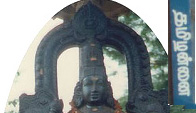
A:நீங்கள் நாளைக்கு என் வீட்டுக்கு சாப்பிட வாருங்கள்!
Tomorrow please come to my house to eat!
B:நாளைக்கு என்ன விசேஷம்? உங்களுக்குப் பிறந்த நாளா?
What is special about tomorrow? Is it your birthday?
A:இல்லை. சும்மாதான்! உங்களுக்கு ஒரு சின்ன விருந்து! உங்கள் மனைவியோடு வந்துவிடுங்கள்.
No. No reason! A small feast for you! Definitely come with your wife.
B:மத்தியானமா? சாயங்காலமா?
Noon or evening?
A:மத்தியானம் இல்லை. சாயங்காலம்தான். சரியாக ஆறு மணிக்கு வாருங்கள்.
Not noon. Evening only. Please come correctly at six o'clock.
B:என்ன சாப்பாடு?
What food?
A: சப்பாத்தி, பூரி, இட்லி, வடை தேங்காய் சட்னி.
Chapatti, poori, idli, vadai, coconut chutney.
B:அடே அப்பா! தடல் புடலா (இருக்கிறது)! ரொம்ப செய்யாதீர்கள். (கொஞ்சம் செய்தால் போதும்).
Oh my! It is grand! Please don't make a lot. If you make a little it will be enough.
A:நிறைய இல்லை. கொஞ்சம்தான். மறக்காதீர்கள். ஆறு மணிக்கு வாருங்கள்.
It's not a lot! It's only a little. Please don't forget. Please come at six o'clock.
B: (கண்டிப்பாக வருகிறோம்.)
We are definitely coming!
- Grammar Notes:
Question Words
Question words in Tamil can occur freely in more than one position in a sentence. Depending upon where they occur and how the stress is placed on them, they have slightly different meanings. For example, யார் முருகன்? would mean #who is Murugan?# but the question முருகன் யார்? with an extra stress on the word யார் can mean #who do you think Murgan is?#. Both of these questions in normal utterances can also mean #which person is called Murgan?# or #who is called Murukan?#.
The following table provides a list of question words along with their spoken form.
| Written form | Spoken form | Meaning |
| யார் | யாரு | Who |
| என்ன | என்ன | What |
| எது | எது | Which (noun) |
| எந்த | எந்த | Which (adjective) |
| ஏது | ஏது | What source |
| ஏன் | ஏன் | Why |
| எங்கே or எங்கு | எங்கே | Where |
| எப்படி | எப்படி | How |
| எப்பொழுதும் | எப்போ | When |
| எத்தனை | எத்தனெ | How many (countable) |
| எவ்வளவு | எவ்வளவு | How much |
Question words and deictic sets
Every language has a class of expressions called #deictic.# Here this simply means words that refer by #pointing to# some.htmlect of the context. The reference of such words, then, vary depending on the context: e.g., who is speaking, where you are, etc. In English, #I#, #you, #he#, #she#, #that#, #there#, etc., are deictics.We have already seen a number of such constructions in Tamil: நான், நீங்கள், நீ, அவர், அவர்கள், அது,, etc. In addition, some deictics tend to occur in contrastive paradigms: e.g., in English, #here/there/where#, #this/that/which#, etc. In Tamil, such constrastive paradigms are extremely regular and vary by the first letter: இ, அ, எ (proximate, distal, question). Consider the following deictic sets:
| Proximate (close to speaker/speech event) | Distal (far from speaker/speech event) | Question word |
| இவன், #this man (impol)# | அவன், #that man (impol)# | எவன், #which man (pol)?# |
| இவர், #this man (pol)# | அவர், #that man (pol)# | எவர், #which man (pol)?# |
| இவள், #this woman (impol)# | அவள், #that woman (impol)# | எவள், #which woman (impol)?# |
| இவர்கள், #this woman (pol), #these people# | அவர்கள், #that woman (pol)#, #those people# | எவர்கள், #which woman (pol)?#, #which people?# |
| இது, #this# (noun) | அது, #that# (noun) | எது, #which?# (noun) |
| இந்த, #this(adj)# | அந்த, #that(adj)# | எந்த, #which(adj)?# |
| இங்கெ, #here# | அங்கெ, #there# | எங்கெ, #where?# |
| இப்பொழுது, #this time#, #now# | அப்பொழுது, #that time#, #then# | எப்பொழுது, #which time?#, #when?# |
| இவ்வளவு, #this much# | அவ்வளவு, #that much# | எவ்வளவு, #how much?# |
| இத்தனை, #this many# | அத்தனை, #that many# | எத்தனை, #how many?# |
| இப்படி, #this way/manner# | அப்படி, #that way/manner# | எப்படி, #how?# (in what manner?) |
| இன்றைக்கு, #this day# (#today#) | அன்றைக்கு, #that day# | என்றைக்கு, #which day?# |
Dialogue: unit_01/section_A/lesson02.html
- Cultural Notes:
Note on Politeness and Formal/Informal Tamil
When introducing someone to others, attention must be paid to use the appropriate polite forms. Elders should be addressed with the form உங்க #your-polite# as opposed to உன் #your-intimate#, which is normally used among equals and children. The plural pronominal forms in Tamil are used to denote polite singular, besides marking plural number. Also, only spoken informal variety is used in speech as opposed to formal literary variety, which is used only in platform speech and written communication. For example, உங்கள் is a formal literary variety whose spoken informal form is உங்க. These two varieties are distinguised based on a sequence of sound changes to the formal variety, as in this case the loss of ள் in உங்கள் makes it an informal spoken variety. This type of sound changes are an automatic phenomenon, and the learner is required to pay extra attention to learn the distinction between spoken informal variety and formal written/literary variety. Sound changes also tend to occur in intra-word level in sentences. Example, the phrase என் பேரு #my name# is used in speech as எம் பேரு with ன் becoming ம் in the word என் due to the following labial plosive sound ப். Stop sounds in Tamil have a tendency to assimilate the preceding nasal sounds to their place of articulation. This type of sound changes is very common in fast speech.
Following table lists a predominantly used formal and informal variety of pronominal forms.
| Formal variety | Informal variety | Meaning |
| நீங்கள் | நீங்க | You |
| உங்கள் | உங்க | Your |
| அவர்கள் | அவுங்க | they/their/his (polite) |
| அவன் | அவர் | He |
| அவள் | அவ/அவுங்க | She |
| தான் | தாங்க | yourself (dialectal) |